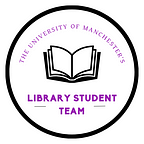Successful searching: making the most of Library Search
By Shalini from the Student Team
I often find myself frantically looking for information, journals and articles that are relevant to my coursework or looking for that one textbook that is always in high demand! With my advice, however, you’ll be able to avoid that frantic feeling (at least to some extent!) by learning to make the most of the University of Manchester Library Search tool.
Library Search has everything in one place and you can access it from anywhere, which is incredibly useful especially when deadlines are creeping up and you just don’t have the time to browse for books in the Library. With it, you can look for lots of different types of resources, including books, e-books, journals, articles, databases and media. But, to get the full advantage of Library Search, you’ve got to know what you’re doing. Here are my tips:
Get Specific
Sometimes, if the keywords you use are too broad, you may have to go through lots of resources before you find one that is relevant to your branch of the topic. On Library Search however, you can use all the search operators that you would use with Google. For more tips on Google, check out our blog post on ‘Making Google work for you’ . On both Library Search and Google, you could type speech marks (“ ”) at the start and end of the phrase. This will ensure that the search does not simply find the individual words, but the entire phrase and will help you find the information that is most relevant to your topic.
Another way to improve your search results is by searching for specified words or phrases. This is useful when you would like to find at least one of the words you have typed into search. One way to make this easier is by typing in ‘OR’ (must be in capital letters) between the words or phrases. For example: Portuguese OR Lusophone. It is also important to brainstorm all the possible words for something when you’re looking for resources. E.g. education OR school OR university. This makes more efficient use of the search tool and will ultimately save you time.
For more useful tips go check out the Library’s website.
Check out our online resources on Successful Searching
As if library search wasn't fantastic enough, My Learning Essentials also has a wealth of online resources and workshops focusing on Successful Searching! Here are a few of my favourites:
1.) The workshop ‘Searching Systematically’
2.) Dissertations: The A-Z of Literature Reviews
3.) Down to Business: Finding Business Information
Library Access
A tool that could massively aid your research is Library Access. It is an extension in your browser which enables easier and faster access to the resources you need. When you’re off-campus, you can use the extension to read electronic journal articles, e-books, reviews and other online material provided by the Library without having to visit the Library website first. What’s more, if the Library has not licensed the resource you need, Library Access will find an Open Access version for you — bliss! We’ve included a video with more information below.
In order to use this you will need to install a browser extension. This browser extension requires a ‘once only’ installation on your laptop or computer. Once you have installed Library Access, select ‘University of Manchester’, and begin your search!
- Chrome Extension
- Firefox Extension (please open in Firefox browser)
If you need more support with Library Access, email the Electronic Resources Helpdesk or call +44 (0)161 275 7388.
Library Search is genuinely the best resource around, it ensures your research is reliable, specific and saves you a tonne of time. Once you master the art of effectively using resources, you’ll be on your way to getting a First in no time!
